What's coming up in Parliament next week?
- Published
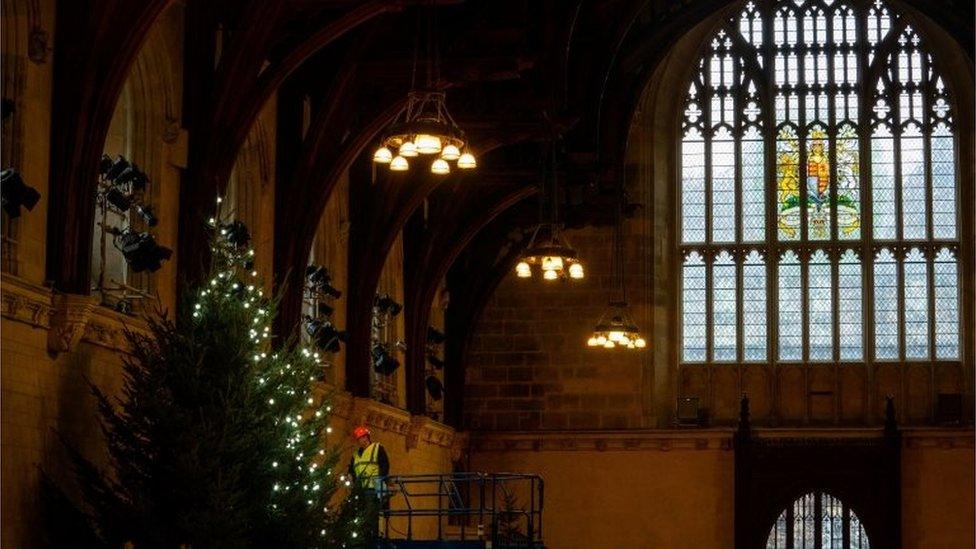
With the prime minister fending off questions about rule-breaking parties with secret Santas, the wallpaper for his Downing Street home and the rescue of dogs and cats from Afghanistan, the government has found itself fighting battles on unexpected fronts, while also having to confront its own backbenchers over the latest Plan B Covid restrictions.
A series of Conservative backbenchers including a good quota of heavyweight ex-ministers, look poised to defy the whip in the Commons votes on Tuesday on the new batch of regulations announced by the prime minister.
This looks unlikely to result in their defeat, with Labour expected to vote for them, but it dramatizes rising levels of Tory discontent, and could inflict long term wounds if a majority of "non-payroll" Conservatives, that is, those who're not ministers or ministerial aides, vote against the government.
There could even be some resignations.
Watch out, meanwhile for the arrival of some significant select committee reports, starting with that of the special Joint Committee on the draft Online Safety Bill which is due to publish its verdict on the government's proposed legislation on Tuesday.
This could have a significant impact on how the government moves to regulate the internet, in the coming year.
Watch out, too, for Public Administration and Constitutional Affairs report on the Elections Bill (due on Monday) and its proposals for Voter ID and powers for the Government to set policy goals for the Electoral Commission.
Here's my rundown of the final parliamentary action of 2021.
Monday 13 December
The Commons week begins (14:30) with an hour of Work and Pensions questions.
The day's main business (see below) is sufficiently thin that I suspect a bit of space is being left for one or more end of term government announcements, made in statements by ministers.
And there's always a prospect of urgent questions as well.
The main legislative action is the latest round of ping pong with the House of Lords over the Armed Forces Bill, the measure which has to be passed every few years, to allow the Army, Navy and RAF to continue in existence.
It's also used to update aspects of the system - and in this case the disagreement between the two houses is over whether service personnel accused of very serious crimes, rape, manslaughter and murder, should be tried in the civilian courts or by courts martial.
The Lords put that requirement into the bill, and the Commons rejected it as unnecessary and unjustified.
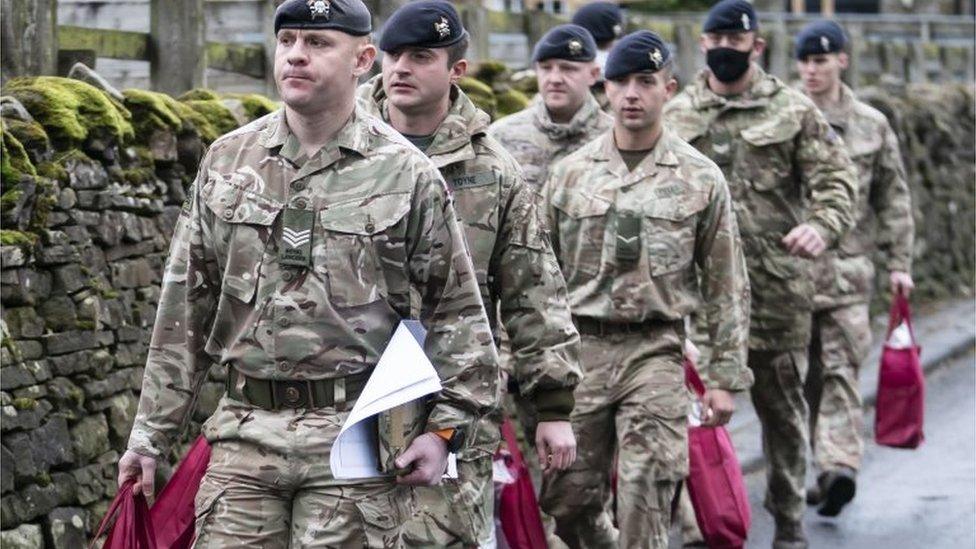
Now the Lords have shot back another amendment insisting that the guidance should say that such offences "shall normally be tried in a civilian court unless, by reason of the circumstances... the director of public prosecutions, after consultation with the attorney general, directs trial by court martial".
What makes this interesting is the personal heat it puts on the Defence Secretary Ben Wallace.
His former junior minister Johnny Mercer spoke in the debate where the first Lords amendment was rejected and told MPs he was in the room when the decision to reject using civil courts was taken by the defence secretary, against the advice of officials and his ministers.
He added "there is no point in coming to this place and railroading through legislation that we all know to be the wrong decision simply because one individual has set his course and refuses to back out of that alley."
In the Lords the Lib Dem ex-judge Lord Thomas of Gresford picked that point up, noting that Mr Mercer had clearly identified the defence secretary as the source of resistance to the amendment, against advice from officials and other ministers.
Watch out for compromise amendments, because time is tight. The Bill must receive Royal Assent by the end of December, when the current Armed Forces Act expires - and that puts the government under serious pressure to offer some concessions.
After that comes report and third reading consideration of the Subsidies Control Bill. This is a post-Brexit measure designed to provide a legal framework for public subsidies, imposing a legal requirement that public authorities may award a subsidy if the subsidy is consistent with principles set out by the government.

In Westminster Hall (16:30) there's a debate on e-petition 587654, calling for the government to introduce regulation of all websites where animals are sold.
The petition, signed by 108,000 people says that websites should be required to verify the identity of all sellers, and for young animals for sale to be pictured with their parents.
Committee action includes Treasury (15:15) looking at jobs, growth, and productivity after coronavirus with leaders from ScaleUp Institute, the Institute of Directors and Make UK.
Public Accounts (16:00) has a session on reducing the backlog in criminal courts, with senior civil servants and officials from the Courts and Tribunals Service, and the super-committee on the National Security Strategy (16:30) focuses on critical national infrastructure and climate adaptation with senior officials from the Met Office, the National Infrastructure Commission and a member of the Adaptation Committee of the UK Climate Change Committee.
In the Lords (14:30) the forty-minute question time ranges across the sustainability and biodiversity impact of the wood pellets used by the Drax biomass power station in Yorkshire, the number of training places for new doctors (an issue likely to feature during the detailed consideration of the Health and Social Care Bill) and whether third Covid jabs should be registered in the NHS COVID app.
Then Peers administer a brief Third Reading rubber stamp to the Animal Welfare (Sentience) Bill, before turning to their second day of detailed consideration of the Police Crime Sentencing and Courts Bill. The debates will focus on amendments dealing with the duty of candour on the police, bail for primary carers and unauthorised encampments.
Tuesday 14 December
The Commons opens (11:30) with an hour of Justice questions
Then Neil Hanvey, the former SNP MP, who switched to Alex Salmond's Alba party presents a Ten Minute Rule Bill calling for a report to Parliament on helping pensioners and people on benefits with their heating costs.
The main debate will be on motions to approve the new public health regulations announced by the prime minister and much will depend on how they are bundled together.
With opposition from several quarters and not least on the Conservative benches, there will be a clamour for a separate vote on the regulations to implement Covid certification, AKA vaccine passports.
And plenty of Conservatives are saying that if they can't vote separately they will oppose the entire package.
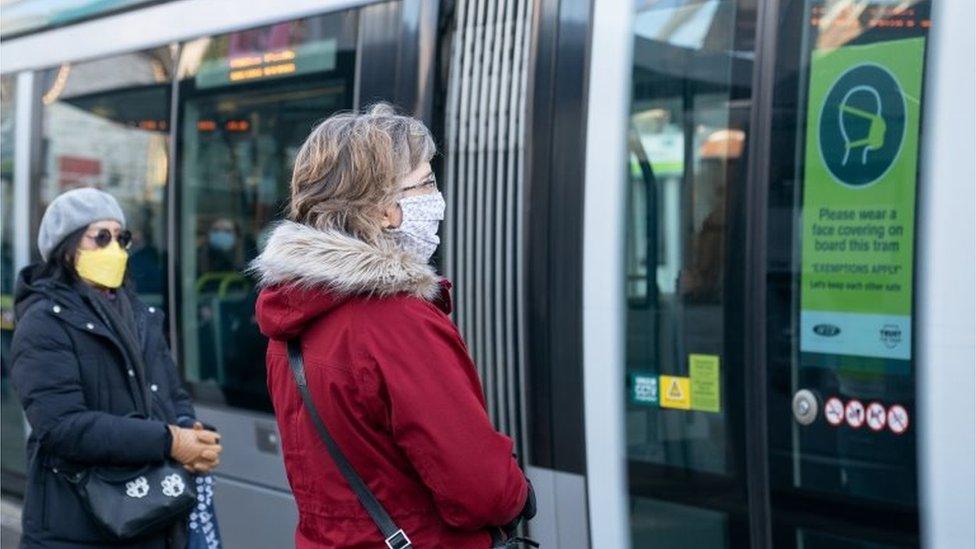
Wednesday ends with what could prove an unusually high-octane adjournment debate - former defence minister Johnny Mercer raises the role of the public prosecution service in Northern Ireland and the UK government's plans for legislation to address the legacy of the Troubles.
He says he will be "shining a spotlight on what happens when convicted terrorists become elected officials or are in judicial oversight positions in Northern Ireland".
It's hard to underestimate the level of backbench Tory fury over the continuing prosecutions of service personnel on charges dating back to the Troubles.
On Thursday another former minister Mark Francois demanded the resignation of the Northern Ireland secretary over that issue. So this won't be your ordinary adjournment.
In Westminster Hall (09:30) the Conservative, Steve Baker, leads a debate on the contribution of co-operatives and mutual societies to the economy and public life - highlighting the small size of the cooperative sector in the UK, but also its strengths and resilience.
Committee action includes Science and Technology (09:30) exploring the current understanding and analysis of the Omicron variant, covering the latest experience of South Africa, with witnesses including Dr Jenny Harries and Dame Kate Bingham.
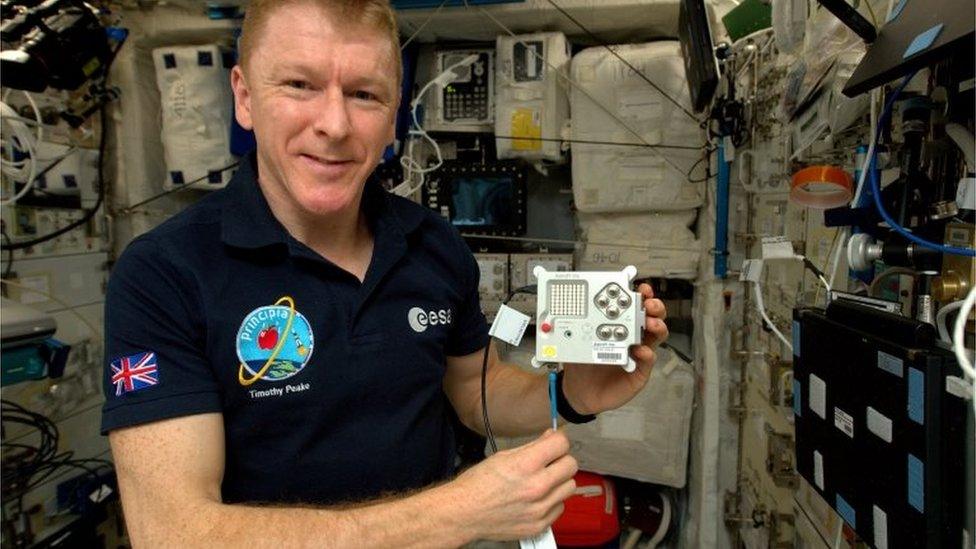
Elsewhere, Education (09:30) hears from business leaders whose companies hire ex-offenders and Defence (14:30) quizzes astronaut Major Tim Peake and Justin T. Johnson of Meta Aerospace on Space Defence - they're expected to cover the government's National Space Strategy and the implications of the increasing militarisation of space.
In the Lords (14:30) ministers field questions on the tariffs on tuna imported from the Maldives, and screening the estimated 1.2 million women in England who missed breast screening during the pandemic
Then peers have their next round of ping-pong - consideration of Commons amendments - on the Armed Forces Bill. The word is that no further votes are expected.
Peers then turn to those Plan B Coronavirus regulations on face coverings and self-isolation - interestingly there is a fatal motion from the Conservative Baroness Noakes, complaining at the lack of an impact assessment, and a regret motion, from Labour's Baroness Thornton complaining that much of the practical operation of the new regulations will depend on guidance which will be issued later.
Then peers debate the detail of the Advanced Research and Innovation Agency Bill - the Dominic Cummings-inspired plan to create a new high science research agency, ARIA, with a budget of £800 million, modelled on the US DARPA (Defence Advanced Projects Research Agency).
At the moment this does not look wildly controversial - there could be votes on amendments to make ARIA subject to freedom of information laws, to set net-zero targets for the Agency and to ensure it retains intellectual property rights on the products of its research.
Wednesday 15 December
Commons business opens (11:30) with half an hour of Scottish questions, followed, at noon, by the last Prime Minister's question time of 2021.
Labour's Lyn Brown has a Ten Minute Rule Bill aimed at "county lines" gangs who use children in drugs rackets.
She wants child exploitation to be a mitigating factor in sentencing of young people in these cases, and wants criminal child exploitation to be an aggravating factor in sentencing of adult gang members.
The main legislative action is the Second Reading debate on the not very controversial Professional Qualifications Bill, which has already cleared the Lords.
Thin-looking business often means that space is being left for some late addition to the agenda
Committee action includes Transport (09:30) concluding its inquiry into airlines and airports: supporting recovery in the UK aviation sector, with evidence from the UK Health Security Agency and then from Aviation Minister Robert Courts and Richard Moriarty of the Civil Aviation Authority
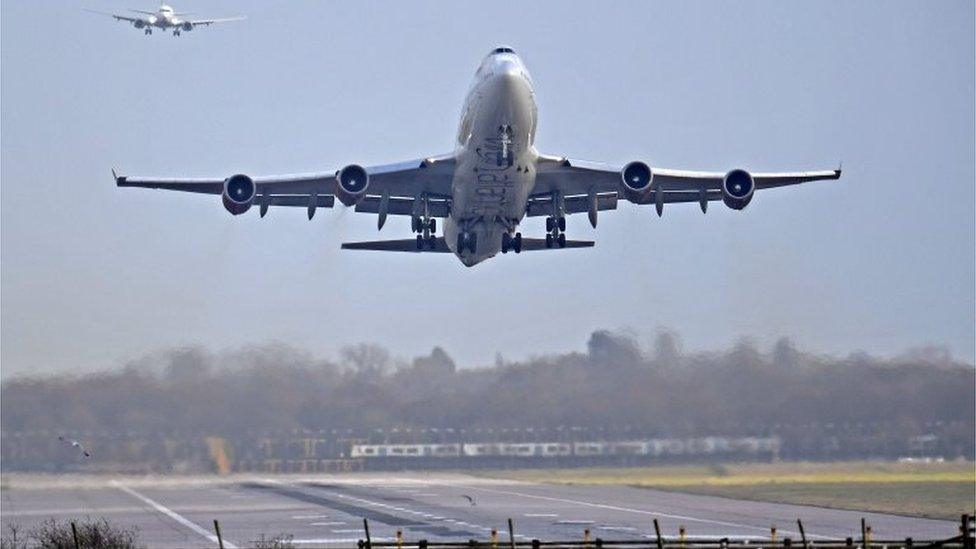
Public Accounts (14:00) questions senior officials at the health department on the growing backlog and increasing delays in elective and critical cancer care in the NHS, in the light of a National Audit Office Report which casts doubt on whether efforts to catch up can work.
Health (16:30) have called in the chief medical officer for England, Chris Whitty, to examine the latest findings about the new Omicron variant of Covid, including those on transmissibility, severity of illness, and vaccine effectiveness. Measures needed to slow the spread of the virus are expected to be discussed.
Welsh Affairs (14:30) holds a one-off session on the Union Connectivity Review, with its Chair, Sir Peter Hendy, followed by Transport Minister Chris Heaton-Harris and Welsh Office Minister David TC Davies.
Questioning will probably centre on improvements to road and rail connectivity in North Wales; better connectivity via HS2 for Wales and upgrades to the South Wales Main Line.
In the Lords (15:00) ministers face questions on the number of young people in alternative education, and the impact of the pandemic on armed conflicts and displaced people across the world.
Then it's Day 3 of detailed debate on the Police, Crime, Sentencing and Courts Bill - with report stage amendments looming on Imprisonment for Public Protection, legal aid for bereaved families and statutory powers for the Sarah Everard enquiry. Detailed debate on the Bill resumes on 10 January.
Thursday 16 December
It's the last day of term before Christmas and the Commons opens for business (09:30) with Transport questions, after which the leader of the House will set out the agenda for MPs' return in January.
The main debate will be the traditional pre-holiday adjournment debate, in which any MP can raise any subject they choose, and a hapless junior minister has to respond to a battery of unrelated issues.
There's no Committee action scheduled
In the Lords, (11:00) peers question ministers on whether first aid and home nursing should be added to the school curriculum, and the Crossbencher Lord Laming, the former chief inspector of social services who was appointed in November 2008 to investigate Britain's social services following the death of Baby P, asks about safe and appropriate accommodation for children and young people in care.
The main debates are on, first, government plans to announce a new UK international development strategy in 2022, led by Labour's Lord McConnell of Glenscorrodale, and then on the importance of the constitutional integrity of Bosnia-Herzegovina, and of upholding the Dayton Agreement, led by the Conservative Lord Bourne of Aberystwyth.
And then, barring some emergency recall, Parliament shuts up shop until Wednesday 5 January.
Events, dear boy, events..... a couple of weeks ago the pencilled-in agenda for Parliament in the final week before the Christmas break seemed to put MPs and Peers into a gentle glide path towards the festive season. Not now.
